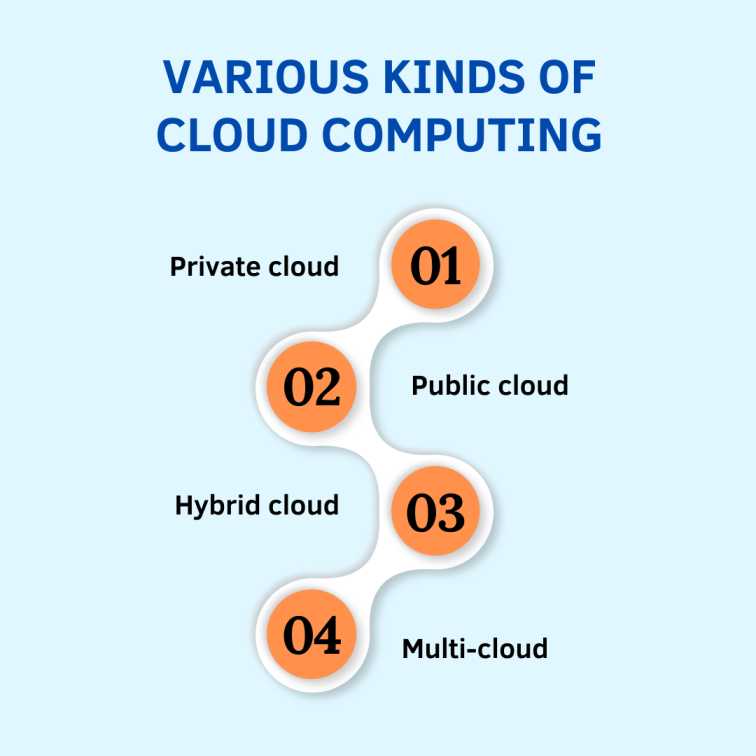Last updated on July 4th, 2024 at 08:35 pm
The cloud consists of online software and services without physical hardware like local computers or on-site servers. In cloud adoption, organisations shift to save money, reduce risk, and scale their databases.
Different organisations adopt the cloud to different extents based on their needs.
How Does Cloud Computing Function?
Cloud computing is similar to leasing IT resources and data centres via the Internet. Rather than constructing and overseeing their IT systems, businesses can tap into storage and software offered by a cloud service provider. They are charged solely for their actual usage.
To better understand this concept, think of cloud computing in two parts: the front and backend. The front end permits users to access data and software stored in the cloud via web browsers or dedicated apps. The back end houses all the data on servers and computers.
For anyone interested in data science training, knowing about cloud computing is essential in today’s world.
How Did Things Work Before the Cloud?
Before cloud computing, you had to install every program and manage all your files on your device. It could quickly eat up your device’s storage and disrupt your work.
Cloud computing moved the core data infrastructure from your device to the internet. Instead of storing everything on your device, you store it online. Cloud computing isn’t just about storage; it also handles essential tasks like processing, streaming, and data management.
What Are Examples of Cloud Computing?
Some cloud computing examples are:
- Education: Institutions of higher learning, such as universities and colleges, benefit from free services like Google Apps for Education (GAE), enhancing efficiency and reducing costs. This is particularly valuable for students pursuing a data science course.
- Government: Governments use cloud-based IT services to provide e-governance services to citizens, improving transaction handling and reducing congestion bottlenecks.
- Health care: Medical professionals use cloud computing for remote hosting of information, diagnostics, and global data sharing. This helps faster prescriptions and updates.
- Big data analytics: Cloud computing supports data scientists in analysing large datasets, deriving insights, and making informed decisions. Tools like Hadoop and Cassandra for big data are essential if you’re enrolled in a data analytics course.
- Business process: Cloud-based solutions like ERP, document management, and CRM streamline business processes. Services like Salesforce and HubSpot enhance reliability by offering data redundancy.
- Communication: Cloud-based communication tools, including email, calendars, and WhatsApp, rely on cloud infrastructure, ensuring seamless data storage and access for users.
- Banking and financial services: Cloud storage is used for financial data and tax record backups, offering security and accessibility to customers.
- Social networking and file storage: Cloud services like Facebook, Gmail, and Dropbox offer easy storage, backup, and synchronisation.
What Are the Typical Applications of Cloud Computing?
Cloud technology has numerous practical uses across different domains, including:
Collaboration: Cloud-based tools like Microsoft 365 and Google Workspace offer seamless cooperation internally and with clients, enhancing productivity and benefiting those aiming to become data analysts.
Storage: Cloud storage services like Amazon S3 and DropBox provide secure data access from anywhere, supporting businesses and individuals in their data analytics careers.
Database: Cloud databases offer flexibility, cost savings, and expertise, serving as a vital resource for data analysts as they manage and analyse data.
Web applications: Businesses rely on cloud-powered web apps to access and share information remotely, aiding professionals in their careers in data analytics by facilitating on-the-go communication and collaboration.
SaaS applications: Software-as-a-Service (SaaS) applications like Salesforce help businesses efficiently store, organise, and automate data, easing data management for aspiring data analysts.
Cloud technology is important for individuals pursuing a career in data analytics. It provides a toolkit and resources that boost communication, foster collaboration, and streamline data management.
What Are the Various Kinds of Cloud Computing?

Cloud Computing doesn’t follow a uniform model. Instead, it can be classified into four distinct categories depending on specific needs:
Private cloud
The IT infrastructure is dedicated to a single organisation in a private cloud. It prioritises security and control, often hosted in-house or managed by a third-party provider. Ideal for organisations with strict regulatory needs, it’s a key consideration for data science certification seekers.
Public cloud
Operated by external providers and shared by numerous internet users, the public cloud delivers services like IaaS, PaaS, and SaaS, catering to businesses and individuals.
Key players like AWS, Azure, Google Cloud, Alibaba Cloud, and IBM Cloud are pivotal for individuals seeking data analytics certification.
Hybrid cloud
Combining elements of both public and private clouds, the hybrid model allows businesses to scale their computing capacity by seamlessly integrating public and private resources.
It’s a cost-effective solution, sparing companies from the hassle of buying and maintaining new servers.
Multi-cloud
Multi-Cloud involves using multiple clouds, be they public or private, from various providers. This versatile approach enables organisations to pick the best-fit services based on their unique requirements, from data analytics to software development.
Benefits of Cloud Computing
Cloud technology presents a multitude of advantages, appealing to businesses of all sizes. These advantages include:
Enhanced collaboration: Cloud applications facilitate seamless communication and secure access to shared information, enabling effortless collaboration among team members. Multiple users can work on documents simultaneously.
Cost efficiency: Businesses can significantly reduce capital expenses as they don’t need to build their IT infrastructure or invest in hardware.
Data security: Cloud vendors prioritise data security by implementing advanced features such as authentication, access management, and data encryption to safeguard sensitive information.
Flexibility and scalability: Cloud computing provides the flexibility to scale up or down computing resources per the organisation’s needs and budget, making it adaptable for businesses of all sizes.
Mobility: Users can access corporate data from any device, anytime, and anywhere via the internet, ensuring productivity even on the go.
Disaster recovery: Cloud providers can handle unforeseen disruptions like hardware failures, natural disasters, and power outages, ensuring high application availability and business continuity.
Automatic updates: Service providers regularly update systems with the latest technology, relieving businesses of manual organisation-wide software updates and ensuring they have access to up-to-date software versions, improved servers, and enhanced processing power.
Conclusion
Cloud Computing has already left a significant mark on the tech landscape, but its growth potential is beyond measure.
It opens up a world of exciting possibilities in various areas, such as Processing Capability, Quantum Computing, and Artificial Intelligence, all aimed at enhancing the power of Cloud Computing.
Imarticus Learning’s Postgraduate Program in Data Science and Analytics not only equips you with a strong foundation in cloud computing and distributed computing while opening doors to a dynamic career in data analytics or data science.
By joining this course, you’ll acquire the knowledge and skills to navigate a career in data science and analytics, helping you to become a data analyst and thrive in this data-driven world.
Visit Imarticus Learning today to learn more about a career in data science with our data analytics certification course.

